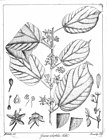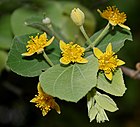Note: This is a project under development. The articles on this wiki are just being initiated and broadly incomplete. You can Help creating new pages.
Grewia tilifolia
Grewia tiliifolia is a deciduous tree growing 12 - 24 metres tall. The bole can be 60cm or more in diameter. The tree is harvested from the wild for local use of its fibre, wood and edible fruit.
Uses
[[:Category:Ayurvedic Herbs known to be helpful to treat |]], [[:Category:Ayurvedic Herbs known to be helpful to treat |]], [[:Category:Ayurvedic Herbs known to be helpful to treat |]], [[:Category:Ayurvedic Herbs known to be helpful to treat |]], [[:Category:Ayurvedic Herbs known to be helpful to treat |]], [[:Category:Ayurvedic Herbs known to be helpful to treat |]], [[:Category:Ayurvedic Herbs known to be helpful to treat |]], [[:Category:Ayurvedic Herbs known to be helpful to treat |]], [[:Category:Ayurvedic Herbs known to be helpful to treat |]], [[:Category:Ayurvedic Herbs known to be helpful to treat |]], [[:Category:Ayurvedic Herbs known to be helpful to treat |]].[1]
Food
Grewia tilifolia can be used in Food. Mature fruits are eaten raw and used in preparation of sherbet (soft drink)[2].
Parts Used
Chemical Composition
Common names
| Language | Common name |
|---|---|
| Kannada | Buttale |
| Hindi | Dhamin |
| Malayalam | Chadicha |
| Tamil | Unnu |
| Telugu | Tada |
| Marathi | Dhaman |
| Gujarathi | Dhaaman |
| Punjabi | |
| Kashmiri | |
| Sanskrit | |
| English |
Properties
Reference: Dravya - Substance, Rasa - Taste, Guna - Qualities, Veerya - Potency, Vipaka - Post-digesion effect, Karma - Pharmacological activity, Prabhava - Therepeutics.
Dravya
Rasa
Madhura
Guna
Lagu, Pichchila
Veerya
Sheeta
Vipaka
Katu
Karma
Kapha, Pitta
Prabhava
Nutritional components
Cleome viscosa Contains the Following nutritional components like - Vitamin-A and C; Quercetin, Kaempferol; Glycosides; Threonine, Phosphoserine, Serin and Taurine; Calcium, Iron, Magnesium, Phosphorus, Potassium, Sodium, Zinc[2].
Habit
Identification
Leaf
| Kind | Shape | Feature |
|---|---|---|
Flower
| Type | Size | Color and composition | Stamen | More information |
|---|---|---|---|---|
| {{{5}}} |
Fruit
| Type | Size | Mass | Appearance | Seeds | More information |
|---|---|---|---|---|---|
Other features
List of Ayurvedic medicine in which the herb is used
Where to get the saplings
Mode of Propagation
How to plant/cultivate
A plant of the moist, lowland tropics and subtropics, where it is found at elevations up to 900 metres[5]. Grewia tilifolia is available from April to September[2].
Commonly seen growing in areas
Photo Gallery
References
- ↑ Indian Medicinal Plants by C.P.Khare
- ↑ 2.0 2.1 2.2 "Forest food for Northern region of Western Ghats" by Dr. Mandar N. Datar and Dr. Anuradha S. Upadhye, Page No.88, Published by Maharashtra Association for the Cultivation of Science (MACS) Agharkar Research Institute, Gopal Ganesh Agarkar Road, Pune
- ↑ [Chemistry]
- ↑ [Morphology]
- ↑ Cultivation
External Links
- Ayurvedic Herbs known to be helpful to treat
- Herbs with Fruits used in medicine
- Herbs with Bark used in medicine
- Herbs with common name in Kannada
- Herbs with common name in Hindi
- Herbs with common name in Malayalam
- Herbs with common name in Tamil
- Herbs with common name in Telugu
- Herbs with common name in Marathi
- Herbs with common name in Gujarathi
- Habit - Deciduous tree
- Index of Plants which can be propagated by Seeds
- Herbs that are commonly seen in the region of Open woodlands
- Herbs that are commonly seen in the region of Shrublands
- Herbs that are commonly seen in the region of Grasslands
- Herbs
- Pages without herbs images


